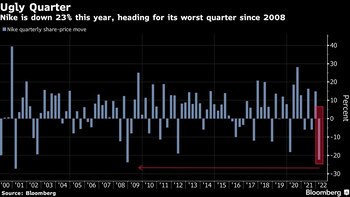
(Bloomberg) In an industry under pressure from rampant inflation, Nike Inc. is taking the brunt as its exposure to the consequences of the war in Ukraine and supply chain problems steered its actions towards its worst quarter since 2008.
So far this year, the stock has fallen by 23%, almost twice the rate of 12% decline in discretionary consumption of the S&P 500 index, while the highest inflation in decades hurts consumer confidence and pockets. The company will report the third fiscal quarter earnings after the markets close on Monday.
Production deficits and transport delays in particular make the report “difficult to predict,” according to Morgan Stanley analyst Kimberly Greenberger. Even if the company delivers better-than-expected results, uncertainty around drivers of poor performance in China, the potential impacts of the Russian invasion of Ukraine, and inventory levels could keep stock range limited.
“Q3 results are unlikely to resolve these persistent debates, delaying any requalification of the material assessment to the Q4 earnings report (in June) or beyond,” Greenberger wrote in a note last week. Nike shares fell by up to 2% on Monday.
Recently, BofA securities analyst Lorena Hutchinson reduced her earnings per share estimates for fiscal years 2022 and 2023, citing exposure to Russia and Eastern Europe, as well as covid-related volatility in China.
Even so, analysts are still largely positive about Nike, which has 28 buy, 7 hold and 1 sell ratings, according to data compiled by Bloomberg. Although several analysts have cut their price targets before profits, the analysts' average target still implies a 30% return potential for the next 12 months.
“We see a compelling buying opportunity for one of our favorite stories of long-term growth,” Beth Reed, an analyst at Truist Securities, wrote in a note last week.
Original Note:
Nike Heads for Biggest Quarterly Drop Since 2008 on Supply Woes
More stories like this are available on bloomberg.com
©2022 Bloomberg L.P.
Últimas Noticias
Debanhi Escobar: they secured the motel where she was found lifeless in a cistern
Members of the Specialized Prosecutor's Office in Nuevo León secured the Nueva Castilla Motel as part of the investigations into the case

The oldest person in the world died at the age of 119
Kane Tanaka lived in Japan. She was born six months earlier than George Orwell, the same year that the Wright brothers first flew, and Marie Curie became the first woman to win a Nobel Prize

Macabre find in CDMX: they left a body bagged and tied in a taxi
The body was left in the back seats of the car. It was covered with black bags and tied with industrial tape
The eagles of America will face Manchester City in a duel of legends. Here are the details
The top Mexican football champion will play a match with Pep Guardiola's squad in the Lone Star Cup

Why is it good to bring dogs out to know the world when they are puppies
A so-called protection against the spread of diseases threatens the integral development of dogs




